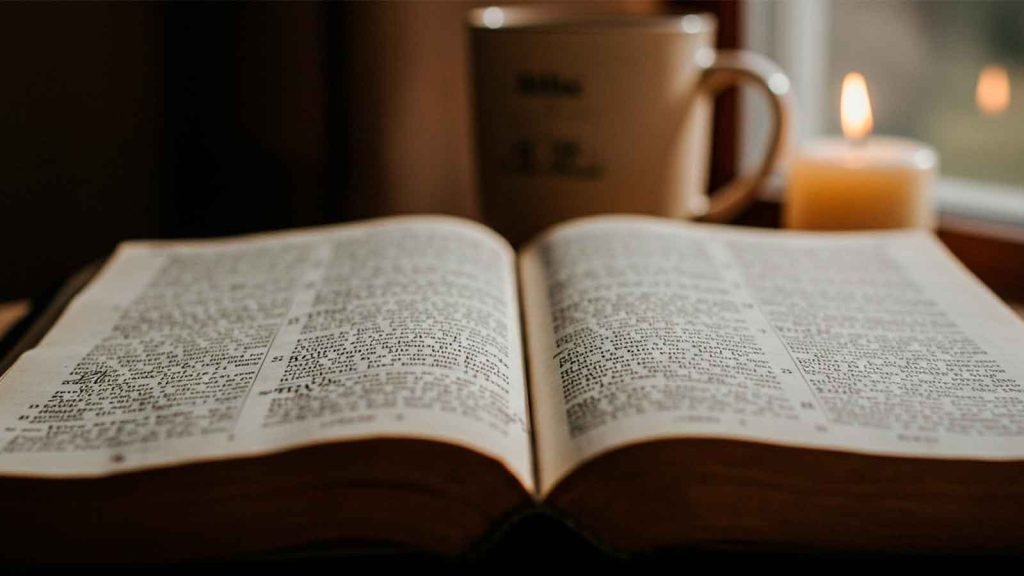Psalm 53
Psalm 53 is a powerful passage of the Bible that exposes the sad reality of human corruption while pointing to the hope found in God’s justice. As we read and meditate on this text, we see how, without God, people become lost in their own ways. This article explores Psalm 53 in depth, explaining its meaning, historical context, verses, and lessons that remain relevant today.
Psalm 53 – Complete Text
¹ The fool has said in his heart, “There is no God.” They have corrupted themselves and committed abominable iniquity; there is no one who does good.
² God looked down from heaven upon the children of men to see if there was anyone who understood, anyone who sought after God.
³ They have all turned aside; together they have become corrupt. There is no one who does good, not even one.
⁴ Do the workers of iniquity have no knowledge, those who devour My people as they eat bread? They have not called upon God.
⁵ There they were in great fear where there had been no fear, for God scattered the bones of those who encamped against you; you put them to shame, because God had rejected them.
⁶ Oh, that the salvation of Israel would come out of Zion! When God restores the fortunes of His people, Jacob shall rejoice, Israel shall be glad.

Psalm 53 Study – Verse-by-Verse Explanation
Psalm 53:1
“The fool has said in his heart, ‘There is no God.’ They have corrupted themselves and committed abominable iniquity; there is no one who does good.”
This verse exposes the spiritual folly of those who deny God’s existence. The word “fool” here does not describe a lack of intelligence but moral and spiritual blindness. Denying God leads humanity into corruption and unchecked sin. The statement “there is no one who does good” highlights the depth of human depravity apart from the divine presence.
Psalm 53:2
“God looked down from heaven upon the children of men to see if there was anyone who understood, anyone who sought after God.”
Here we see God as an attentive observer, examining humanity to find someone wise and righteous. The verse reveals that seeking God is the mark of true understanding—and that such a pursuit is rare. God’s expectation is frustrated by the absence of genuine faith in human hearts.
Psalm 53:3
“They have all turned aside; together they have become corrupt. There is no one who does good, not even one.”
This verse reinforces the universality of sin. The phrase “all turned aside” indicates that no human being can remain righteous on their own. The word “corrupt” carries spiritual weight, pointing to impurity before God. It is a blunt portrait of humanity’s sinful nature.
Psalm 53:4
“Do the workers of iniquity have no knowledge, those who devour My people as they eat bread? They have not called upon God.”
The psalmist expresses indignation against those who oppress God’s people. The metaphor “devour My people as they eat bread” underscores the cruelty and ease with which they commit evil. They lack reverence and fear, for “they have not called upon God.” Their prayerlessness reveals a complete separation from spirituality and humility.
Psalm 53:5
“There they were in great fear where there had been no fear, for God scattered the bones of those who encamped against you; you put them to shame, because God had rejected them.”
This verse describes God’s judgment on the wicked. Terror overtakes them suddenly and without visible cause, reflecting guilty consciences and God’s action against His enemies. The phrase “God scattered the bones” symbolizes complete defeat. The confusion of adversaries is the direct result of God’s rejection.
Psalm 53:6
“Oh, that the salvation of Israel would come out of Zion! When God restores the captives of His people, Jacob shall rejoice, Israel shall be glad.”
The psalm ends with a cry and a hope: salvation coming from Zion. It is a declaration of faith in God’s act of restoring His people. The mention of Jacob rejoicing and Israel being glad shows that spiritual deliverance and divine justice will bring celebration among the faithful.

Origin and Authorship of Psalm 53
Psalm 53 is attributed to David and is almost identical to Psalm 14, with a few subtle variations. It belongs to the second book of the Psalter and emphasizes the folly of rejecting God’s existence. The main difference between the two psalms is the more frequent use of the name “Elohim” (God) in Psalm 53, whereas Psalm 14 uses “YHWH” (Lord).
The Context in Which It Was Written
It is believed that David wrote this psalm during a time of great moral and spiritual crisis in Israel. The people were distant from God, acting wickedly and without fear. Psalm 53 is therefore a call to repentance and awareness of spiritual reality.
Structure and Analysis of Psalm 53
Psalm 53 contains only six verses, yet its content is intense. It is divided into two major parts: the foolishness of those who deny God and the certainty of divine justice.
Psalm 53:1
“The fool says in his heart, ‘There is no God.’ They are corrupt and commit abominable iniquity; there is no one who does good.”
The psalmist begins with a direct critique of those who deny God’s existence. This denial is not merely intellectual; it is linked to a corrupt lifestyle. The folly here is spiritual, not mental.
Psalm 53:2
“God looks down from heaven on the children of men to see if there is anyone who understands, anyone who seeks God.”
This verse portrays God carefully observing humanity, searching for those who sincerely seek Him. It is the picture of an attentive God, yet disappointed with what He finds.
Psalm 53:3
“Everyone has turned away; they have together become corrupt; there is no one who does good, not even one.”
The emphasis here is on the universality of sin. Psalm 53 declares that all, without exception, have turned away from God. This statement is a stark reminder of humanity’s fallen condition.
Psalm 53:4
“Do the workers of iniquity not understand—those who devour My people as they eat bread? They do not call upon God.”
Here David denounces those who oppress God’s people. The psalm underscores that such wickedness occurs because these individuals have no fear of God.
Psalm 53:5
“There they were in great terror, where there was nothing to fear, for God scatters the bones of those who encamp against you; you put them to shame, because God rejects them.”
This verse speaks of the unjustified fear of the wicked, contrasted with God’s mighty intervention for the righteous. God is the supreme judge, and the enemies of His people will be put to shame.
Psalm 53:6
“Oh, that salvation for Israel would come out of Zion! When God restores the fortunes of His people, Jacob will rejoice and Israel will be glad.”
This final verse is an expression of hope and faith. Even in the face of widespread wickedness, the psalmist trusts that God will bring deliverance and restoration to His people.

Lessons Psalm 53 Teaches Us
Denying God Leads to Corruption
Denying God’s existence is not only a question of faith but also of morality. Psalm 53 shows that life without God leads to decay and injustice.
God Sees Everything
Even when evil seems to prevail, Psalm 53 assures us that God is attentive to human actions and will act at the right time.
God’s People Are Protected
Though the righteous may suffer, Psalm 53 reaffirms that God intervenes and defends His people.
There Is Hope in Salvation
The cry for salvation from Zion points to the promise of restoration, fulfilled on many levels throughout biblical history.
Applications of Psalm 53 in Daily Life
Reflect on Our Attitudes
Psalm 53 invites us to examine whether we are truly seeking God or living as if He does not exist.
Trust in Divine Justice
In times of corruption and wickedness, the psalm reminds us that God’s justice never fails.
Strengthen Your Faith
Knowing that God is attentive and will bring salvation should strengthen the faith of those who trust in Him.
Curiosities about Psalm 53
- Psalm 53 is one of the few biblical texts that is almost identical to another (Psalm 14), underscoring its importance.
- It is often cited in theological discussions on original sin and human depravity.
- It is quoted in Romans 3:10-12, where Paul speaks about the sinful condition of all people.
Comparison between Psalm 53 and Psalm 14
Although very similar, Psalm 53 uses “God” (Elohim) instead of “Lord” (YHWH), perhaps indicating a broader audience beyond Israel. Additionally, the tone of Psalm 53 is even more focused on God’s action against His enemies.
Why Is Psalm 53 Still Relevant Today?
We live in times when many question God’s existence or ignore His presence in daily life. Psalm 53 remains current because it shows that distancing oneself from God has spiritual and moral consequences. It also reminds us that there is a just God who sees everything and will bring salvation to His faithful people.
Key Verses for Meditation
- “There is no one who does good, not even one.” — Psalm 53:3
- “Oh, that the salvation of Israel would come out of Zion!” — Psalm 53:6
FAQ about Psalm 53
What does “the fool says in his heart, ‘There is no God’” mean?
It means that denying God is a sign of spiritual foolishness, for those who do so live without direction and stray from what is good.
Is Psalm 53 the same as Psalm 14?
Almost. They address the same theme but have small linguistic and stylistic differences.
What is the main message of Psalm 53?
That all have sinned, yet God will bring salvation to His people.
How can I apply Psalm 53 to my life?
By sincerely seeking God, rejecting corruption, and trusting in His justice.
READ ALSO:
- Psalm 48: The Greatness of God Revealed in Zion
- Psalm 49: An Invitation to Reflect on True Wealth
- Psalm 47: Exaltation to the Supreme God Who Reigns over the Whole Earth
- Psalm 45: A Royal Song of Love and Glory
FOLLOW US ON FACEBOOK
I hope you enjoyed it.
Leave your message of faith below!